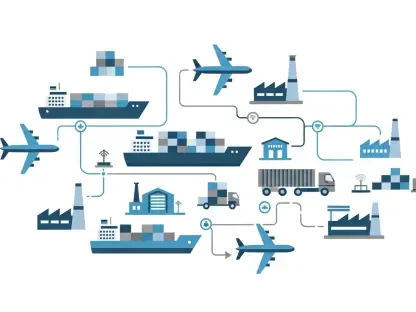The air cargo market in Bangladesh has faced unprecedented upheaval due to the recent political unrest. The protests, instigated by student opposition to a government job quota system favoring veterans of the 1971 independence war, have spiraled into a nationwide anti-government movement. The ensuing chaos has paralyzed cargo operations, leading to significant disruptions and escalating costs. As the protests gained momentum, the government’s measures to quell the unrest have further complicated the logistics and supply chain sectors, causing industry insiders to draw parallels to the disruptions seen during the Covid-19 pandemic but potentially consider the current situation as more severe.
Widespread Protests and Government Crackdown
The origins of the protests lie in the students’ frustration with a government job quota system perceived as unfair and discriminatory. Initially confined to criticizing the quota system, the movement soon gained momentum and evolved into a broader anti-government demonstration, capturing widespread public support. The government responded with heavy-handed measures aimed at suppressing the unrest, including road blockades and internet shutdowns, which effectively brought cargo movements to a standstill and made communication incredibly difficult for logistics operators.
The situation on the ground became increasingly volatile, with frequent clashes between protesters and law enforcement. The severe crackdowns included the use of lethal force, which resulted in fatalities and only heightened the tension and chaos. Consequently, the disruptions extended beyond immediate public order concerns, wreaking havoc on logistics and supply chains across the nation. As a result, the overall efficiency of cargo operations faced unprecedented challenges, leading to severe economic repercussions.
Operational Standstill and Backlogs
The immediate impact of the government’s measures was a complete halt in cargo operations until July 25, creating extensive backlogs that industry players are still grappling with. Dhaka airport, a critical hub in the supply chain, found itself overwhelmed by the volume of cargo waiting for transport, making it clear that the current logistical infrastructures were not equipped to cope with such disruptions swiftly. Despite the resumption of operations, the area remains choked with shipments, struggling under the weight of the backlog and limited flight options.
Exporters have been hit hard, dealing with the twin challenges of escalating costs and considerable delays. For many, the bottleneck at Dhaka has been a stark indicator of the inadequacy of infrastructural and logistical capabilities, highlighting an urgent need for modernization and capacity expansion. The ripple effect of these delays has spread through the entire supply chain, causing significant economic strain and drawing comparisons to previous crises, albeit with potentially more severe outcomes this time around.
Surging Freight Rates and Economic Strain
One of the most immediate and visible consequences of the unrest has been the dramatic increase in freight rates, exacerbated by the scarcity of flights and limited capacities. The cost of shipping cargo to Europe has now surged to about $6 per kg, while transportation to the US has reached a staggering $8.50 per kg. These figures represent a threefold increase from standard rates, underscoring the acute supply constraints faced by the industry.
This rapid price inflation is symptomatic of the acute supply constraints and economic strain faced by exporters, who find themselves forced to absorb these inflated costs or pass them on to consumers. This scenario places numerous businesses in precarious financial positions, potentially undermining the economic stability of sectors reliant on air freight. The broader economic repercussions of the ongoing political turmoil thus become evident, signaling the need for greater resilience in the logistics sector.
Exploring Alternative Logistics Routes
Faced with untenable freight rates and significant delays, freight forwarders and exporters have had little choice but to explore alternative routes to maintain the flow of goods. One popular solution has been air-air services through major hubs such as Colombo, Singapore, Malé, and Dubai. Others have resorted to road-air services via Delhi and sea-air combinations through Colombo and Dubai, each with their own sets of challenges and benefits.
These alternatives, while mitigating some of the pressure on direct air freight routes, come at the cost of extended transit times and increased logistical complexity. For instance, air-air and road-air services from Dhaka to Europe or the US now take approximately 10 days, whereas sea-air combinations can stretch up to 22 days via Dubai and 14 days via Colombo. Such extended timelines introduce additional complexity and cost, straining an already fragile supply chain system that is grappling with the compound effects of the unrest.
Broader Supply Chain Bottlenecks
The disruptions in the air cargo market are reflective of the broader bottlenecks plaguing Bangladesh’s logistics network. Chittagong port, another critical node, is also experiencing decelerated activities due to the compounded effects of the political unrest, contributing to the strain on the supply chain. This slowdown exacerbates the challenges faced by businesses already grappling with delayed air shipments and high freight costs.
The cumulative effect of these disruptions is pushing demand for airfreight to historic levels, reminiscent of the surge observed during the Covid-19 pandemic. Industry insiders, however, suggest that the current disruptions could be even more severe due to the compounded political, social, and infrastructural challenges facing the nation. The need for strategic solutions and long-term investments in the logistics sector has never been more apparent.
Industry Resilience and Adaptation
Despite the significant challenges, the air cargo industry in Bangladesh has shown remarkable resilience and adaptability. Industry players are leveraging innovative solutions and alternative routes to ensure the continuity of operations. This crisis has underscored the importance of flexibility and rapid adaptation in the face of unforeseen disruptions, driving the industry to adopt more agile practices.
Freight forwarders are implementing advanced logistical strategies, incorporating new technologies, and fostering collaborative efforts to navigate the complex landscape. These efforts, while commendable, also highlight the critical need for long-term infrastructural improvements and better capacity planning. As the industry adapts to current challenges, the lessons learned will be vital in building a more resilient and robust supply chain system for the future.
Calls for Infrastructure and Capacity Investments
The air cargo market in Bangladesh is grappling with unprecedented turmoil due to recent political unrest. The turmoil began when students protested against a government job quota system that favors veterans of the 1971 independence war. What started as a focused grievance against this policy has erupted into a nationwide anti-government movement. This upheaval has severely disrupted cargo operations, causing substantial delays and rapidly escalating costs.
As the protests gathered steam, the government’s attempts to suppress the unrest have only exacerbated the situation. These measures have further complicated logistics and the supply chain sector. Industry experts are beginning to compare these disruptions to those experienced during the Covid-19 pandemic. Some even suggest that the current disruptions might be more severe due to the rapid escalation and broad impact across various logistics sectors. With cargo operations paralyzed, the economic impact is already becoming increasingly evident, putting additional stress on an already fragile system.









